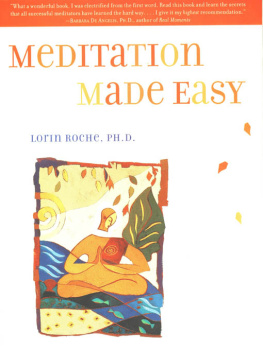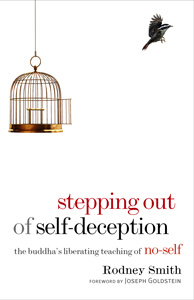Peter Sedlmeier
The Psychology of Meditation
Varieties, Effects, Theories, and Perspectives
Library of Congress Cataloging in Publication information for the print version of this book is available via the Library of Congress Marc Database under the LC Control Number 2022931601
Library and Archives Canada Cataloguing in Publication
Title: The psychology of meditation : varieties, effects, theories, and perspectives / Peter Sedlmeier.
Names: Sedlmeier, Peter, author.
Description: Includes bibliographical references.
Identifiers: Canadiana (print) 20220162662 | Canadiana (ebook) 20220162719 | ISBN 9780889375765
(softcover) | ISBN 9781616765767 (PDF) | ISBN 9781613345764 (EPUB)
Subjects: LCSH: Meditation. | LCSH: MeditationPsychological aspects. |
LCSH: MeditationTherapeutic use. | LCSH: Mindfulness (Psychology)
Classification: LCC BF637.M4 S43 2022 | DDC 158.1/2dc23
2022 by Hogrefe Publishing
www.hogrefe.com
The authors and publisher have made every effort to ensure that the information contained in this text is in accord with the current state of scientific knowledge, recommendations, and practice at the time of publication. In spite of this diligence, errors cannot be completely excluded. Also, due to changing regulations and continuing research, information may become outdated at any point. The authors and publisher disclaim any responsibility for any consequences which may follow from the use of information presented in this book.
Registered trademarks are not noted specifically as such in this publication. The use of descriptive names, registered names, and trademarks does not imply, even in the absence of a specific statement, that such names are exempt from the relevant protective laws and regulations and therefore free for general use.
The cover image is an agency photo depicting models. Use of the photo on this publication does not imply any connection between the content of this publication and any person depicted in the cover image.
Cover image: goo.gl/73nyq6 iStock.com with overlay of Figure 3.2 (The Buddhist Noble Eightfold Path)
PUBLISHING OFFICES |
USA: | Hogrefe Publishing Corporation, 44 Merrimac Street, Suite 207, Newburyport, MA 01950 |
Phone +1 978 255-3700; E-mail customerservice@hogrefe.com |
EUROPE: | Hogrefe Publishing GmbH, Merkelstr. 3, 37085 Gttingen, Germany |
Phone +49 551 99950-0, Fax +49 551 99950-111; E-mail publishing@hogrefe.com |
SALES & DISTRIBUTION |
USA: | Hogrefe Publishing, Customer Services Department, |
30 Amberwood Parkway, Ashland, OH 44805 |
Phone (800) 228-3749, Fax (419) 281-6883; E-mail customerservice@hogrefe.com |
UK: | Hogrefe Publishing, c/o Marston Book Services Ltd., 160 Eastern Ave., Milton Park, |
Abingdon, OX14 4SB |
Phone +44 1235 465577, Fax +44 1235 465556; E-mail direct.orders@marston.co.uk |
EUROPE: | Hogrefe Publishing, Merkelstr. 3, 37085 Gttingen, Germany |
Phone +49 551 99950-0, Fax +49 551 99950-111; E-mail publishing@hogrefe.com |
OTHER OFFICES |
CANADA: | Hogrefe Publishing, 82 Laird Drive, East York, Ontario, M4G 3V1 |
SWITZERLAND: | Hogrefe Publishing, Lnggass-Strasse 76, 3012 Bern |
No part of this book may be reproduced, stored in a retrieval system or transmitted, in any form or by any means, electronic, mechanical, photocopying, microfilming, recording or otherwise, without written permission from the publisher.
Printed and bound in the USA
ISBN 978-0-88937-576-5 (print) ISBN 978-1-61676-576-7 (PDF) ISBN 978-1-61334-576-4 (EPUB)
https://doi.org/10.1027/00576-000
About the Author
Peter Sedlmeier is professor of psychology at Chemnitz University of Technology, Germany. He mainly teaches research methods and cognitive psychology. Apart from the psychology of meditation, his current areas of interest include intercultural research, time processing, and computer modeling of cognitive and statistical processes. He has been practicing meditation for more than 20 years, mostly Zen, interspersed with some extended excursions into the Theravada world, and some experience in yoga meditation and transcendental meditation (TM).
|IX| Preface
The present volume attempts nothing less than to give a state-of-the-art summary of what we currently know about the psychology of meditation. Of course, one volume cannot possibly summarize everything, and as an author I had to make some difficult choices, but the aim of this work is to give a representative overview of what psychological science has achieved so far in this area, as well as which problems are still around. One could say that the main point of the book is to prepare the reader for the suggestions for future research given in the last chapter.
There is much confusion in meditation research about what meditation is, how it is embedded in various practicing contexts, and why people meditate at all. Therefore, this book puts an emphasis on clarifying these questions in reviews the astonishingly few attempts at finding out why people begin to meditate at all and why they stay with it.
.
The usual order of presentation in books on a given scientific topic is to begin with the theory part and then present and discuss the empirical evidence in light of the theories. This book does it the other way round, and there is a justification for that: So far, the bulk of meditation research has been conducted with little or no theoretical background. To be sure, there are theories of meditation, and they will be summarized in .
As mentioned above, all of this that is, a summary of the varieties, the effects, and the theories of meditation can be seen as a preparation for the last part of the book, presenting perspectives on meditation research (). For seasoned meditation researchers, it might be that not that much in the book will really be new. However, I am not aware of any other book that takes so many pains to prepare the argument that meditation research definitely needs to be improved regarding which, some suggestions will be offered here. Measured by the number of publications, meditation research is already a success story, but its real success hinges on how well we understand the psychology of meditation. Such a profound understanding, which would express itself in a good theory (or in several good theories), will certainly help to improve the practice of meditation. But it also has the potential to reach far beyond meditation research proper, to the enrichment of our understanding of consciousness and cognition.
Although this book officially has only one author, it is in fact the product of many peoples efforts who contributed in one way or another. As this is a book on meditation, I begin with my teacher AMA Samy, thanking him for all I learned from him. Many aspects of what is covered in this book only became much clearer to me (still with some room for improvement though) by discussing them with fellow meditators, meditation teachers, and researchers interested in meditation. Some of them deserve special mentions and thanks: Ven. Angulgamuwe Ariyananda, Britta Biedermann, Matthijs Cornelissen, William van Gordon, Carl Hooper, Caroline Jones, Sonali Marwaha, Ven. Nanasiri, Bhikkhuni Agga Nani, Veerachart Nimanong, Ulrich Ott, Ramakrishna Rao, and Ajahn Suphan. I owe much to my friend K. Srinivas who sadly passed away so prematurely. While I was on sabbatical at Pondicherry University, India, he, being a philosophy professor himself, opened the door to Indian philosophy for me. Without him, there would be no in this book (at least not as it looks now).












